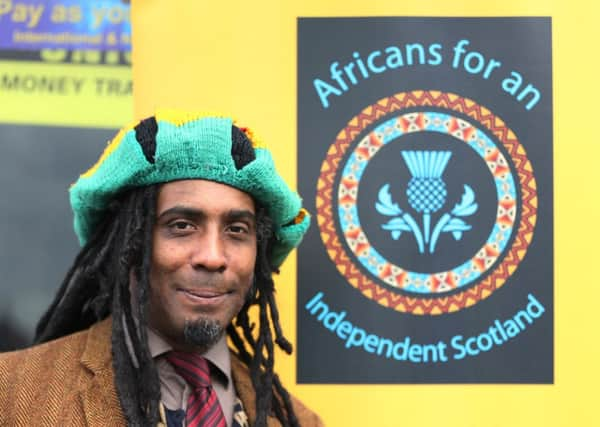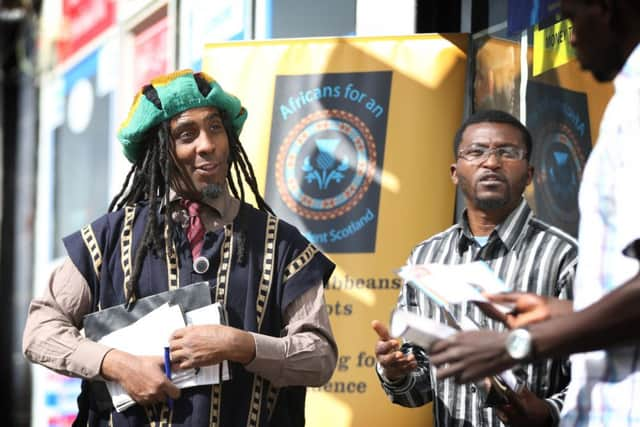Scottish African immigrants hopes for independence


Home at the moment for Graham Campbell is Sighthill, a housing scheme to the north of Glasgow, but he is laying the foundations for something bigger. “We get independence,” he says. “We like the egalitarian, welcoming spirit in Scotland, it’s a country that shares traditions close to the hearts of our people. We like what it has to offer but as outsiders, we can also see its potential.”
Advertisement
Hide AdAdvertisement
Hide AdA Jamaican-born, London-raised Rastafarian poet, musician, writer and charity fundraiser, Mr Campbell is the convener of Africans for an Independent Scotland (AfIS), though his Nigerian friends calls him oga pata pata - the boss. It is a fitting sobriquet, for come 18 September, the slim, dreadlocked figure in a crocheted rastacap, mustard brown tweed jacket and trainers could well influence the decision of a voter bloc the size of Motherwell.


Like many pro-independence grassroots organisations in the orbit of the main Yes Scotland campaign, AfIS has flown under the radar of the mainstream debate, but it has been heralded by key figures in the Yes camp, including Blair Jenkins, the chief executive of Yes Scotland and Shona Robison, the equalities minister. More importantly in a referendum that looks set to go to the wire, its arguments carry considerable weight among the African, Caribbean and Afroscots communities that call the land of Jock Tamson home.
Campaign
On an overcast afternoon in Glasgow’s east end, Mr Campbell and a few colleagues have assembled outside African Embassy, a labyrinthine minimarket in the east end of Glasgow catering to the Mother Continent’s children. With leaflets in English, French and Arabic and a banner swaying uneasily in a light crosswind, the multicultural band seek to convince those patrons who are eligible to have their say in a fortnight’s time to join their league.
Inside, the Duke Street emporium is a sensory delight. Its small hair salon does a steady trade in cornrows and braiding while a rack of DVDs offer up Nollywood’s latest and loudest exports. The aisles, stacked deep and high, are chock full of delicacies such as beef biltong, dried yellow mystus and the irresistibly sweet smell of freshly baked Agege bread. Everyone I speak to, however, believes the choice advocated by AfIS to be even more gratifying.
Sitting in the barber’s chair while he has his head shaved, Kabir Rauph shoots me a quizzical glance in the mirror when I ask of his intentions. “It has to be yes, doesn’t it?” the 36-year-old replies. A Nigerian advertising student, he has already returned his postal ballot. For all the setbacks it has endured since gaining independence 54 years ago, he believes his homeland’s autonomy should inspire Scotland to follow suit. “A country deserves to control its economy and its future and the SNP’s argument for that is the best option,” he reasons.
According to the 2011 census, there are around 30,000 Africans and 7,000 people from Caribbean nations living in Scotland, 0.7% of the population. Once those with refugee status and nationals from the likes of Angola and the Democratic Republic of Congo are discounted, the vast majority are qualifying Commonwealth citizens, able to decide Scotland’s future. Mr Campbell estimates around 30,000 will take to the ballot boxes.
“Independence is not a journey without problems, but none of us would turn our backs on it,” explains the 46-year-old, one of the few members of Scotland’s Afro-Caribbean community to have stood for office. “Our countries left Britain’s control and understood the challenges that meant, but in this instance, Scotland will have all the advantages we didn’t have.”
For AfIS, a key motivation is the desire to wrest control of immigration and asylum policies from Westminster and reshape them in a more progressive mould. Chimezie Umeh, the group’s secretary, argues that around 80% of asylum claimants in Scotland are Africans, the majority of whom are women fleeing persecution, dictatorships, war zones and the threat of rape and torture. Mr Campbell, the son of a Jamaican father and Grenadian mother, agrees the promise of a new approach to immigration and visas is integral.
Advertisement
Hide AdAdvertisement
Hide Ad“Independence would mean a better life for Africans in Scotland, mainly because of the restrictions around student visas and the lack of a post-study work visa, which the Scottish Government has promised to reintroduce. The country needs to raise its working age population and most of our community fits that demographic, with two thirds of them holding degree level qualifications.
“The other big issue in our is immigration. Although around half the community are students, workers and migrants, those who have refugee status have suffered because of the UK Border Agency. It is an organisation that has made our lives hell in terms of establishing a community and we want to see it gone.”
Beyond such issues, these new Scots hold a profound unshakeable belief that self-government is an inherent right. In the words of Chinaka Odum, a University of Strathclyde graduate who has lived in Castlemilk for six years, it represents a “natural state” of being. “Africans get that independence isn’t one vision, it’s a blueprint, an idea, a chance to make something new,” says the 36-year-old.
The group’s Yes vote is not unequivocal - some Africans, Mr Odum reveals, have fallen for “scaremongering” warnings they would be unable to travel to London - while others, claims Mr Campbell, believe “a guest shouldn’t set the rules when they’re in someone else’s home.” Even among many committed to the cause, support is conditional on AfIS being party to the negotiations for a written constitution.
Yet the consensus seems to be that in two weeks, Scotland’s Afro-Caribbean fraternity will vote en masse for change, continuing the long and storied narrative towards self-determination began by their parents, grandparent and great-grandparents decades ago and thousands of miles away. As another old African proverb has it, wherever a man goes to dwell, his character goes with him.
SEE ALSO: